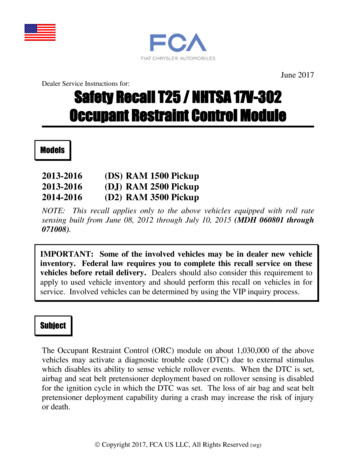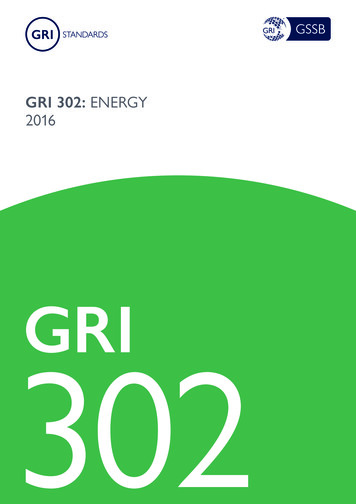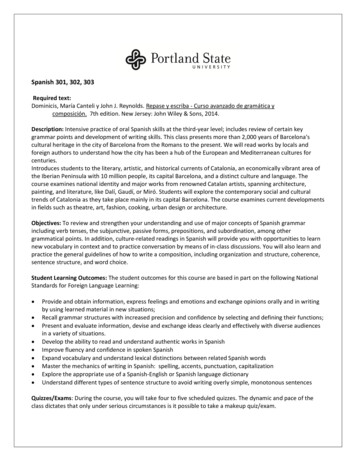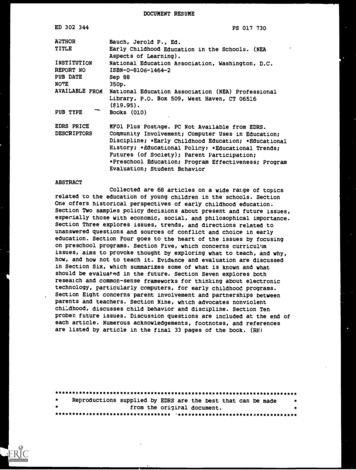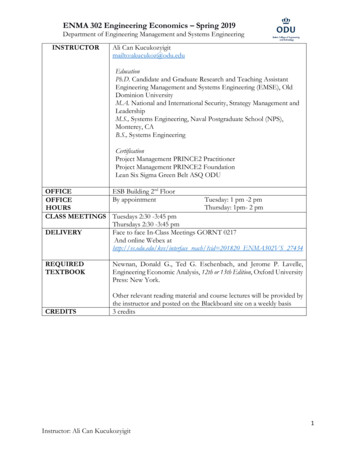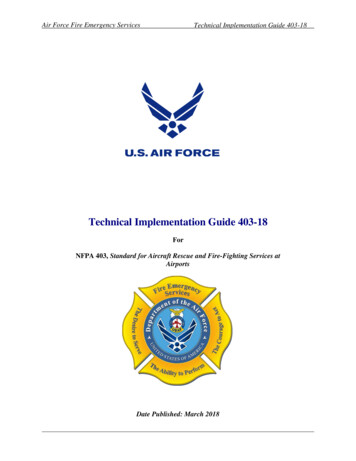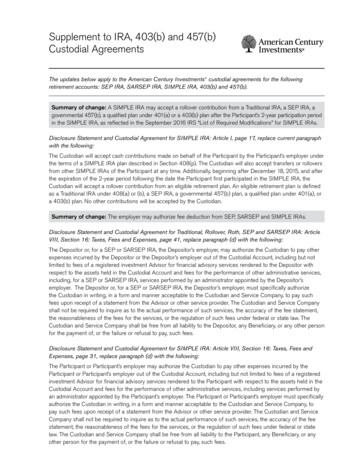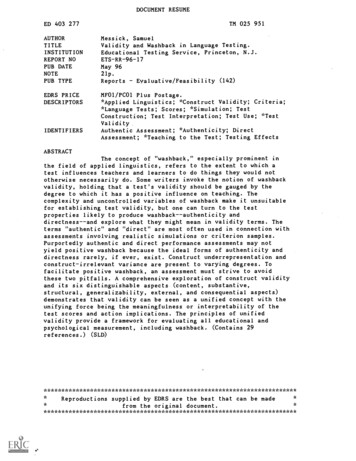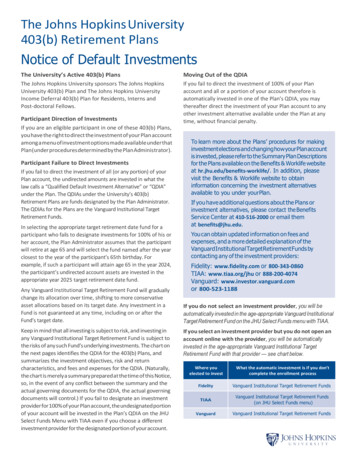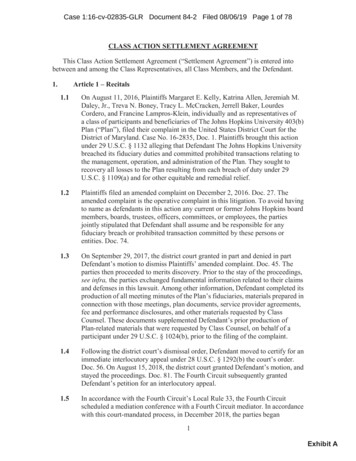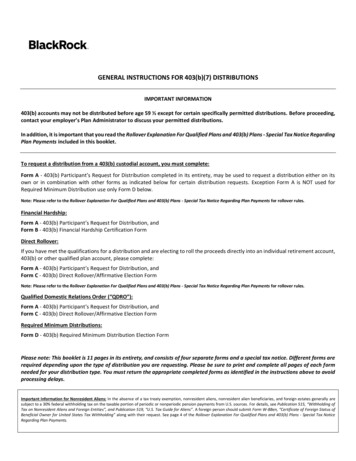
Transcription
DOCUMENT RESUMEED 403 683TITLEINSTITUTIONSPONS AGENCYEC 302 321Nutrition and Feeding Practices: What You Need ToKnow. A Series for Caregivers of Infants andToddlers. Model for Interdisciplinary Training forChildren with Handicaps: MITCH Module 10.Dade County Public Schools, Miami, Fla.; MonroeCounty School District, Key West, FL.Florida State Dept. of Education, Tallahassee. Bureauof Education for Exceptional Students.PUB DATENOTEPUB TYPE90EDRS PRICEDESCRIPTORSMF01/PC07 Plus Postage.Attitudes; Body Weight; Child Caregivers; ChildHealth; Day Care; Dietetics; *Disabilities; *EatingHabits; *Food; Infants; Inservice Education;*Nutrition; Preschool Education; *Special HealthProblems; ToddlersFlorida; Model of Interdisciplinary Training ChildHandicapIDENTIFIERS165p.; For related documents, see EC 302 310-325.Non-Classroom Use (055)GuidesABSTRACTIntended for use in Florida training programs forcaregivers of infants and toddlers with disabilities, this guidepresents an overview of the Model of Interdisciplinary Training forChildren with Handicaps (MITCH); offers a user's guide to the series;and provides specific information for presenting Module 10, whichfocuses on nutrition and feeding practices. After the introduction tothe MITCH program as a whole, the user's guide provides informationon the instructor's role, the 3-hour training session, the use ofvideotapes and audiotapes, and follow-up activities. For this module,goals and objectives focus on providing participants with anunderstanding of the basic food groups, nutrition risk factors,practices which instill positive attitudes toward food, theimportance of eating a variety of foods, correct portion size, thenormal development of feeding skills, and feeding problems. For eachhour of training, a script, suggested activities, and relevanthandouts are provided. Attached are lists of recommended resourcesand references, reproducible forms and handouts, and forms for the6-week follow up. Also attached is a nutrition handbook for parentsand teachers which includes information on nutritional risks,appetite and weight, vitamin and mineral supplements, pica,allergies, dental health, infantilism, disruptive mealtime behavior,food texture, school lunch program, diet and hyperactivity, drugnutrient interactions, and special infant concerns. *************************Reproductions supplied by EDRS are the best that can be madefrom the original ******************************
3U.S. DEPARTMENT OF EDUCATIONOffice of Educations' Research and ImprovementEDUCATIONAL RESOURCES INFORMATIONCENTE R (ERIC)t haS been reproduCed asreceived from the person or orgamtationoriginating it"ThisMITCH Module 10tj Minor changes have been made 10 improvereproduction QualityModel of Interdisciplinary Trainingfor Children with HandicapsPoints of view or opinions stated in this docu-ment do not necessarily represent officialOERI position or policy.A Series for Caregivers of Infants and Todd!Nutrition and FeePractices: Wha outo KnowseAAAAAAvs"PERMISSION TO REPRODUCE THISMATERIAL HAS BEEN GRANTED BYAAAhAAAAAAnAwAAAnTO THE EDUCATIONAL RESOURCESINFORMATION CENTER (ERIC)."AAAwAAAAAA1990BEST COPY AVAILABLE2wA.AAAAAAAAA. A A.nAAAArawr4AAAFlorida Department of EducationDivision of Public SchoolsBureau of Education for Exceptional StudentsA isAAAAAA11"A AA A
s.This training series is one of many publications available through the Bureau ofEducation for Exceptional Students, Florida Department of Education, designed toassist school districts, state agencies which operate or support educational programs,and parents in the provision of special programs for exceptional students. Foradditional information on this training series, or for a list of available publications,contact the Clearinghouse/Information Center, Bureau of Education for ExceptionalStudents, Division of Public Schools, Florida Department of Education, FloridaEducation Center, Tallahassee, Florida 32399-0400 (telephone: 904/488-1879;Suncom: 278-1879; Special Net: BEESPS).
MITCH Module 10Model of Interdisciplinary Trainingfor Children with HandicapsA Series for Caregivers of Infants and ToddlersNutrition and FeedingPractices: What You Needto KnowFlorida Department of EducationDivision of Public SchoolsBureau of Education for Exceptional Students1990
This training series was developed through the MITCH (Model of InterdisciplinaryTraining for Children with Handicaps) Project, FDLRS/South Associate Center, Dadeand Monroe County Public Schools, and funded by the State of Florida, Departmentof Education, Division of Public Schools, Bureau of Education for ExceptionalStudents, under State general revenue appropriation for the Florida Diagnostic andLearning Resources System.CopyrightState of FloridaDepartment of State19905
MITCH Module 10Model of Interdisciplinary Trainingfor Children with HandicapsA Series for Caregivers of Infants and ToddlersNutrition and FeedingPractices: What You Needto KnowSheah Rarback, M.S., R.DDirector of NutritionMailman Center for Child DevelopmentUniversity of MiamiMiami, FloridaCindy Nicholson, O.T.R.Occupational TherapistMailman Center for Child DevelopmentUniversity of MiamiMiami, Florida
Dade County School BoardDr. Michael Krop, ChairmanMs. Janet R. McAlileyMr. G. Holmes Bradcock, Vice-ChairmanMr. Robert RenickDr. Rose Castro FeinbergMr. William H. TurnerMrs. Betty Kaplan7iv
Project MITCH StaffCarole Fox Abbott, Ph.D.MITCH Project SpecialistDiana M. FernandezMITCH Project AssistantFDLRS/South MiamiFDLRS/South MiamiProject MITCH Advisory BoardHost AgenciesMary Anne BrostProject DirectorFDLRS/Gateway - JasperDr. Eleanor L. LevineSupervisorFDLRS/South - MiamiDr. Susan GoldAdjunct Assistant ProfessorMailman Center - MiamiDr. Keith ScottProject DirectorFDLRS/Mailman - MiamiTern KanovExecutive Director, Division ofExceptional Student EducationDade County Public Schools - MiamiDr. Mary Theresa UrbanoDirector of NursingMailman Center - MiamiOtherDr. Mimi GrahamAdjunct Assistant ProfessorFlorida State University TallahasseeLois KlezmerCoordinator, Early Childhood Education andSim LesserAssistant Professor, Early Childhood EducationMiami Dade Community College - MiamiLinda MachadoParent AdvocateChairperson, State Advisory Council onExceptional Student Education - MiamiElizabeth P. RidgleyDirector, Pinecrest PresbyterianPreschool - MiamiDr. Sharon VaughnAssociate Professor of EducationUniversity of Miami - MiamiSondra WallaceDirector of EducationDr. Joyce Mc CallaDirectorMetro Dade Child Development Services MiamiHead Start Miami01William OsterhoudtDirectorExceptional Student EducationMonroe County Public Schools Key West
ACKNOWLEDGEMENTSIn addition to the MITCH Advisory Board members, special thanks are given to thefollowing:The Bureau of Education for Exceptional Students (BEES) EditorialCommitteeDoris B. NabiAdministratorProgram ServicesAtlene DuncanProgram SpecialistClearinghouse/Information ServicesProgram ServicesRuth S. Jones, Ph.D.SupervisorProgram ServicesElizabeth DeVore, D. C.Program SpecialistPrekindergarten Handicapped ProgramsConnie Cauley, Ph.D.Program SpecialistInfants and Toddlers ProgramPrekindergarten Handicapped ProgramsCritical readers and persons who piloted, reviewed, and tested this moduleLinda BickySpeech and Language PathologistSpeech and Hearing Center - MiamiSusan Gold, Ed.D.Assistant Professor of PediatricsMailman Center for Child Development MiamiArlene Brett, Ed.D.Associate ProfessorUniversity of Miami - MiamiJanice C. KelleyPre-K Handicapped SpecialistFDLRS/Gateway JasperRobert L. CannonSpeech and Language PathologistLillian PonsDirectorSpeech and Hearing Center - MiamiFDLRS/South MiamiBetty J. ClawsonMonroe County SpecialistFDLRS/South - Key WestL. Penny RosenblumTeacher of Visually ImpairedMailman Center for Child DevelopmentMiamivi
Other contributors:Lisa A. Rozpad, Program Specialist, for desktop publishing, Mailman Center for ChildDevelopment - MiamiEllen White, for design and production of handouts, FDLRS/South MiamiCarol Frazee, Nutrition Education and Training (NET) for permission to reproduce Nutritionand Handicapped Children, A Handbook for Parents and Teachers, Division of PublicSchools, Florida Department of Education - Miami
TABLE OF CONTENTSIntroductionProject MITCH OverviewMITCH ModulesMITCH BookletsUser's Guide to SeriesInstructorInstructor QualificationsRole of InstructorInstructor Preparation and Follow-ThroughThe ITCH Theme MusicAttendanceSix-Week Follow-Up ActivityCertificate of CompletionRecord of CompletionSpecific Information for Presenting Module 10Goals and ObjectivesOther Recommended InstructorsContact ListEquipment, Materials, and SuppliesEquipmentSuppliesMaterials Contained in This ManualVideotapeMaterials Not Contained in This ManualHour 1Goals and ObjectivesContentHour 2Goals and ObjectivesContentHour 3Goals and ObjectivesContentResource ListReferencesAppendicesA. Reproducible Forms for Three-Hour ModuleB. Reproducible Copies of Handouts/Overheads/BookletsC. Reproducible Forms for the Six-Week Follow-Up 3142324394055566971
IntroductionInformation in the Introduction should be reviewed by each instructor or user of thismaterial. The Users Guide to Series begins on page 5. Information relating to this modulebegins on page 11.PROJECT MITCH OVERVIEWThe purpose of the Project MITCH (Model of Interdisciplinary Training for Childrenwith Handicaps) training series is to assist local school districts in Florida in providinginterdisciplinary training and resources to parents, non-degreed daycare workers andhealthcare providers who work with special needs infants and toddlers ages 0-5, withemphasis on ages 0-2.This series was funded by a grant to the Florida Diagnostic and Learning ResourcesSystem/South (FDLRS/South), on behalf of the FDLRS Network, from the FloridaDepartment of Education, Bureau of Education for Exceptional Students (BEES).In 1987, the Florida Legislature designated 100,000.00 of the total appropriation forthe FDLRS Network to "expand services to infants and preschool children." The applicationsubmitted by Dade County on behalf of the FDLRS/South Associate Center serving Dadeand Monroe Counties was selected for funding and was initiated on May 25, 1988.FDLRS/South collaborated with FDLRS/Mailman atthe Universityof Miami andFDLRS/Gateway, serving Hamilton, Columbia, Lafayette, Madison and Suwannee Counties,to complete the work under the grant. Outcomes of the project include:assessment of the status of training and resources for the designated populationdesign of a collaborative implementation and training model to include developmentof competencies, replicable training modules which enhance or expand the HRSeight-hour special needs child care module, an adapted training plan for daycareproviders, recommendations for curricula to be used in daycare and preschoolprograms and recommendations for provision of consultation to parentsvalidation of the training modules in Dade, Monroe and counties served byFDLRS/Gatewayprovision of training for potential instructors and other interested personnel in the 18FDLRS Associate Center service regions.
Topics for the eleven training modules, as well as information which provided thebasis for the competencies, policy framework and other products of Project MITCH, wereobtained from a literature search, interviews and letters of inquiry and needs assessments sentto over 600 persons throughout the state of Florida. The modules were written by severalauthors from various disciplines, including early childhood education, exceptional studenteducation, nursing, occupational and physical therapy, speech and language, nutrition andsocial work. Each module was read by several critical readers and was piloted in both northand south Florida at least three times before final rewriting took place.The training series emphasizes developmentally appropriate practice and normaldevelopment as the means for working with youngsters who have special needs. The eleventhree-hour modules that currently make up the series have relevance for caregivers ofnormally developing children as well as caregivers who may be working with children whoare handicapped, experiencing delays or who may be at-risk. Although several of themodules specifically address normal and abnormal development from birth to 36 months ofage, the material is also meaningful to caregivers of preschoolers who are chronologicallyolder but who are functioning developmentally within the birth to three year range.MITCH MODULESEleven MITCH training modules have been developed.(1)Intellectual Development: What You Can Do to Help(2)Speech and Language Development: What You Can Do to Help(3)The Child Who Seems Different: Meeting Special Needs(4)Family Functioning: The Impact of a Child with Special Needs(5)Listening and Sensory Integration: What to Do Before Speech and Language Develop(6)The Caregiving Environment: Planning an Effective Program(7)Behavior Management: Preventing and Dealing with Problem Behavior(8)Health Care: Infection Control, Medication Administration, and Seizure Management(9)Motor Development: What You Need to Know(10) Nutrition and Feeding Practices: What You Need to Know(11) Working Together: Communication Skills for Parents, Caregivers, and Other Professionals.2
Each of the three-hour modules can be used independently. Although the modulesare numbered sequentially, they may be presented in any order since no module providesprerequisite material for another. Each module contains a script for the instructor, activities,references, resource list, and reproducible handouts/overheads. In some cases, a videotapeand/or an audiotape and other materials are available to supplement the written material.MITCH BOOKLETSThree booklets have also been prod
Dr. Mimi Graham Adjunct Assistant Professor Florida State University Tallahassee. Lois Klezmer Coordinator, Early Childhood Education and Sim Lesser Assistant Professor, Early Childhood Education Miami Dade Community College - Miami. Linda Machado Parent Advocate Chairperson, State Advisory Council on Exceptional Student Education - Miami. Dr .
